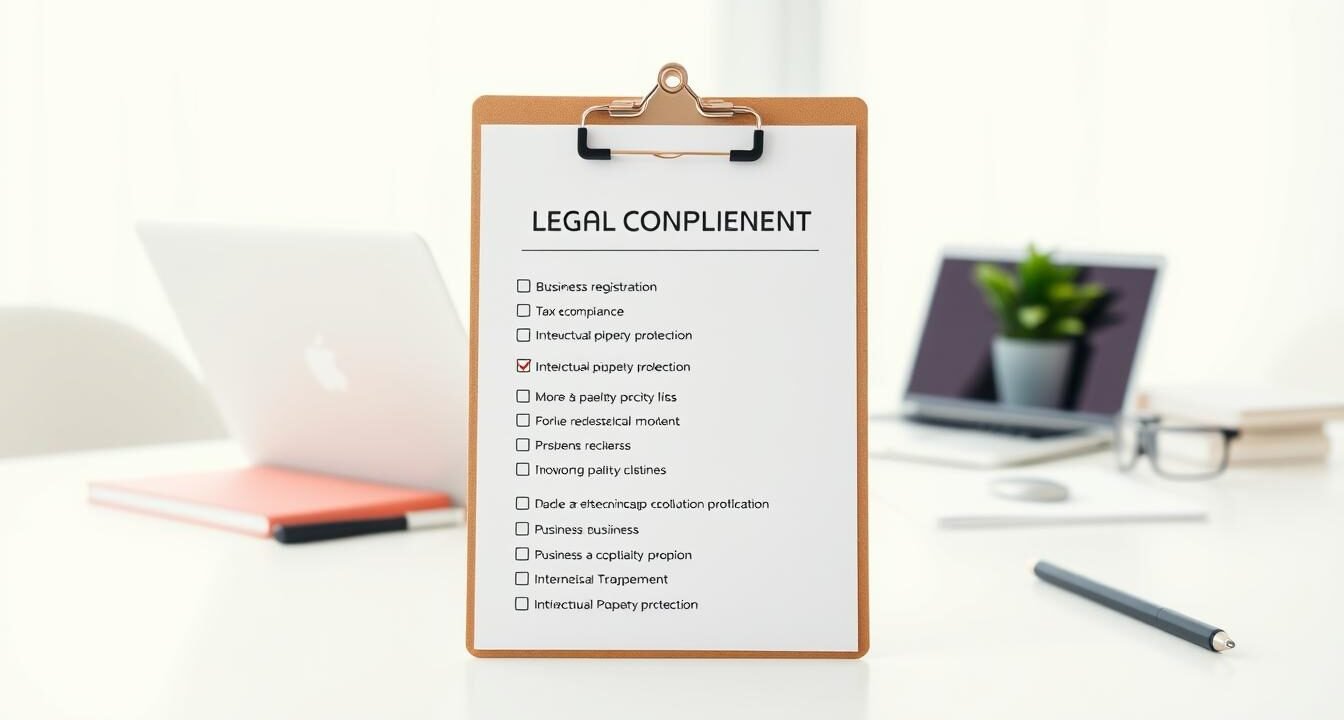
Starting a business is more than just a good idea or market research. It requires attention to tax IDs, licenses, and compliance in over 75,000 places1. Skipping these steps can lead to fines, lawsuits, or even closure. Sadly, over 70% of startups fail because of legal mistakes2.
Most small businesses are either sole proprietorships (73% in the U.S.) or LLCs (38% for tax benefits)2. But, only 50% register their business names2, making them open to disputes. Even simple steps like getting an Employer Identification Number (EIN) are missed by 25% of small businesses2.
Important areas include state-specific rules like workers’ compensation insurance1 and foreign qualification filings1. The Legal Checklist for New Businesses must also cover taxes, contracts, and permits. These vary by industry and location. Over 60% of businesses don’t know their tax obligations2, putting them at risk of penalties.
Key Takeaways
- Over 75,000 jurisdictions enforce compliance rules1.
- 70% of startups fail due to legal missteps2.
- 38% of small businesses choose LLCs for liability protection2.
- 25% skip critical EIN filings, risking tax penalties2.
- Most industries require at least one permit to operate legally1.
Understanding the Importance of Legal Compliance
Legal Compliance for Startups is more than just paperwork. It’s the key to sustainable growth. Small Business Legal Obligations help startups avoid major problems. This builds trust with investors, partners, and customers, setting the stage for growth.
For example, startups that seek legal advice during funding see a 60% increase in investment opportunities3.
Why Legal Requirements Matter for Startups
Without legal frameworks, 20% of businesses fail in their first year due to legal issues3. A solid legal base reduces risks and makes tax filing easier. Yet, over 75% of startups are unclear about their legal status, leading to tax and liability problems3.
Well-drafted contracts can cut disputes by 30%3.
Consequences of Ignoring Legal Obligations
Ignoring Small Business Legal Obligations can be costly. Half of small businesses face penalties for not following the law3. Data privacy violations can lead to fines of up to $42,000 per offense4.
Not protecting intellectual property can cost startups their market share, as 80% of startups neglect this3. Poor employment practices can also lead to 40% of startups facing hiring challenges3.
| Risk | Data |
|---|---|
| Legal Structure Ignorance | 75% of startups lack clarity3 |
| Data Privacy Fines | $42,000 per violation4 |
| IP Neglect | 80% of startups risk revenue loss3 |
| Penalties | 50% face legal consequences3 |
Holon Law Partners says being proactive about compliance reduces risks and leads to long-term success5. By focusing on legal foundations, startups can turn compliance into a competitive edge.
Choosing the Right Business Structure
Every startup must pick a business structure that fits its goals within the Legal Framework for Startups. This choice affects liability protection and tax duties under Startup Corporate Governance. In the U.S., over 70% of businesses start as sole proprietorships because they are simple6. But, this structure doesn’t protect personal assets. Let’s look at options that match your vision.
Overview of Business Structures
Sole proprietorships are simple to start but expose owners to personal liability6. Partnerships share profits and losses but need formal agreements. LLCs offer liability protection and flexibility, growing 16% yearly6. Corporations (S and C) allow for growth but have strict rules. Each choice impacts taxes, ownership, and future growth.
Pros and Cons of Each Structure
| Structure | Pros | Cons |
|---|---|---|
| Sole Proprietorship | No formation costs, full control | No personal asset protection6 |
| LLC | Liability protection + tax flexibility7, low compliance | Paperwork to maintain status |
| C Corporation | Unlimited shareholder capacity6, scalability | Double taxation7 |
LLCs avoid double taxation with “flow-through” taxes7, and S corporations limit shareholders to 1007. Check state fees—NY LLCs cost $200 to form plus biennial fees6. Choosing the right structure ensures you follow the law and prepares for growth within the Legal Framework for Startups.
Registering Your Business Name
Choosing the right business name is crucial. It protects your brand and follows Legal Checklist for New Businesses. Not doing this can cause legal problems, like name conflicts or trademark issues. Here’s what you need to know.
Importance of a Unique Business Name
A unique name builds trust and protects your brand. Over 25% of small businesses fail to register their name, facing legal risks8. Registering also secures domain names and bank accounts under your brand. Sole proprietors need to file a DBA (Doing Business As) in their state8.
This ensures your name isn’t taken and avoids future disputes.
Steps to Register Your Business Name
1. Check Availability: Search state databases to confirm your name isn’t already in use.
2. File Official Papers: Submit forms to your state agency, paying fees typically between $10–1008.
3. File a DBA (if needed): Required for sole proprietorships and partnerships8.
4. Consider Trademarks: Federal trademarks offer nationwide protection but require separate applications.
| Business Structure | Registration Steps | Common Costs |
|---|---|---|
| Sole Proprietorship | DBA filing + trademark options | $50–$150 |
| Partnership | State filing + partner agreement | $100–$300 |
| LLC/Corporation | Included in formation documents | $100–$800 |
Always check state-specific rules—Legal Checklist for New Businesses changes by location9. Use resources like the Small Business Administration for state guides. Protect your brand’s identity from the start to avoid costly delays later.
Obtaining Necessary Licenses and Permits
Starting a business means getting the right licenses and permits. Not doing this can lead to fines or even closing down10. The rules depend on your business type and where you are, like health permits for restaurants or construction safety11.
Types of Licenses and Permits Required
Federal licenses cover things like FCC radio use permits. State licenses include professional certifications for lawyers or contractors11. Local permits might be for zoning or food handling. Special permits are needed for healthcare or alcohol sales10.
The Small Business Administration offers guides for different industries. This makes it easier to understand the process11.
How to Apply for Licenses and Permits
First, check federal guidelines on the SBA website. Then, reach out to state agencies for specific needs11. You’ll need to provide business info, ID, and pay fees. Remember to keep track of renewal dates to avoid penalties.
Many states have online portals to make applying easier10. For example, healthcare startups need FDA approval, and retail stores might need sales tax permits11.
Understanding Employment Laws
Building a team means understanding Startup Business Regulations about employee rights and contracts. Startups must follow federal and state laws. For example, the federal minimum wage is $7.25, but California requires $15.50 per hour12
Mandatory Employee Rights
Employees deserve fair treatment. Federal rules require overtime pay at 1.5x the regular rate for hours over 40 weekly12. Laws also protect against bias in hiring, like a Silicon Valley startup faced for biased job ads13.
The Family and Medical Leave Act (FMLA) gives up to 12 weeks of unpaid leave for eligible employees. OSHA prevents workplace hazards, like a Boston biotech firm was fined for13.
Importance of Employee Contracts
Clear contracts prevent disputes. They should define roles, pay terms, and non-compete clauses. A Seattle software startup was sued for $1 million over unclear intellectual property ownership13.
Contracts must outline termination procedures and comply with ERISA if offering retirement plans14. Update policies regularly to keep up with changing laws, as 70% of startups face legal issues14.
Maintaining compliance builds trust and avoids penalties. Startups must balance flexibility with legal rigor to protect their teams and growth.
Intellectual Property Considerations
Intellectual property (IP) is key for startups, protecting things like logos and software. Laws help keep these innovations safe for your business. By choosing the right protections, you follow legal rules and grow your value.
Types of Intellectual Property Protections
There are four main types: patents, trademarks, copyrights, and trade secrets15. Patents give 20-year protection for new inventions16. Trademarks protect your brand symbols, and copyrights cover creative works15. Trade secrets, like a secret recipe, need confidentiality agreements15. Design patents last 15 years for product looks16.
How to Protect Your Intellectual Property
Start by registering trademarks early with the USPTO’s “intent to use” option17. File patents quickly to catch Shark Tank investors’ attention17. Use NDAs for employees to keep trade secrets safe16. For global startups, use the Madrid Protocol for international filings. Regular checks keep you in line with legal changes16.
Drafting Legal Documents
Every startup needs a solid Legal Checklist for New Businesses to succeed. Contracts and agreements are more than just paper. They are the backbone of Startup Corporate Governance. Without them, verbal agreements can lead to expensive legal battles.
For instance, Meta Platforms, Inc. was fined €1.2 billion for data mishandling. This shows how ignoring legal rules can harm businesses18.
Contracts make handshake deals official. They outline roles in employment contracts and protect trade secrets with non-compete clauses. Arbitration agreements can solve disputes quicker than court cases.
Legal Nodes assists startups in 20+ countries with these documents, ensuring they follow the law19. Verbal agreements can lead to misunderstandings. But written contracts provide clarity and legal safety.
| Document | Purpose | Example |
|---|---|---|
| Operating Agreement | Guides LLC management decisions | Ownership voting rules |
| Employment Contracts | Defines job terms and IP ownership | Stock option vesting schedules |
| Non-Disclosure Agreements (NDAs) | Protects confidential information | Used in tech startups sharing prototypes |
| Privacy Policy | Complies with GDPR and PDPA | Amazon’s ESOPs include data handling clauses19 |
Other important documents include shareholder agreements and buy-sell clauses. They prevent founder disagreements. A stock purchase agreement details share transfers, and SAFEs simplify early funding19.
These documents are not just paperwork. They are legal shields that protect startups from risks.
Setting Up Tax Compliance

Managing Tax Compliance for New Ventures means knowing federal, state, and local tax rules. Startups often struggle due to limited funds20. But setting up taxes right can save you from big fines. Federal taxes include income, payroll, and sales taxes, depending on your business type21.
For example, corporations face a 21% federal tax rate. States like California charge a $800 minimum franchise tax21. Small Business Legal Obligations also include quarterly payments, payroll taxes, and sales taxes in states like New Jersey with 11.5% corporate rates21.
Missing deadlines can lead to fines. Delays over two weeks can cost you20. Keeping accurate records helps avoid audits. Founder’s CPA clients raised over $200M in venture capital by following strict tax rules20.
| State | Corporate Tax Rate | Minimum Franchise Tax |
|---|---|---|
| California | N/A | $80021 |
| New Jersey | 11.5%21 | Varies by revenue |
| Delaware | 0%21 | $350–$230K+ based on shares21 |
Get an Employer Identification Number (EIN) online from the IRS22. Even sole proprietors need an EIN for banking or payroll22. After that, register with your state, like California’s FTB. Startups should track their tax obligations early, says Curt Mastio, who has worked with 200+ companies20.
Navigating Health and Safety Regulations
Health and safety rules are key for Startup Business Regulations. They protect both people and profits. Ignoring these rules can lead to huge fines23. Knowing the basics keeps your business safe and strong.
Overview of Compliance Standards
Every industry has its own set of rules. OSHA requires safety training and controls to prevent injuries. The Americans with Disabilities Act (ADA) makes sure places are accessible.
Food startups must pass health inspections to avoid big fines23. Not having the right licenses in states like Minnesota can cost a lot23. Regular audits can reduce risks by 30%23, so staying informed is crucial.
| Regulation | Requirements | Penalties |
|---|---|---|
| OSHA | Monthly safety drills, emergency exits | $15,000 per violation23 |
| ADA | Wheelchair access, clear signage | $75,000 for first violations23 |
| Workers’ Comp Insurance | Mandatory in 49 states | Penalties up to $10,00023 |
Importance of Workplace Safety
Safety programs are smart business moves. Companies with strong policies see better employee awareness23 and lower insurance costs. For example, clean kitchens in food businesses avoid shutdowns and lawsuits.
Training and risk assessments spot risks early. This builds trust with employees and customers. Startups in healthcare or construction must follow FDA and industry-specific rules. A 510(k) filing for medical devices ensures products meet safety standards24.
Regular reviews of equipment and processes keep teams safe and compliant. Even small oversights can lead to penalties: 30% of small businesses face legal fights from non-compliance23.
Staying proactive means safer teams and a stronger bottom line. Use checklists, training, and tools like compliance software to simplify tracking. Your employees’ well-being and your startup’s future depend on it.
Financing and Securities Laws
Securities laws control how startups get funding. They affect every step, from early investors to venture capital. Ignoring these laws can lead to legal trouble and missed chances.
Understanding Securities Regulations
The Securities Act of 193325 says even deals with friends are securities. The SEC makes sure these rules are followed to protect investors26. To invest, you must have a certain income or wealth.
Accredited investors need to make at least $200k a year or have over $1M in net worth25. Non-accredited investors need full details, as per Regulation D’s Rule 506(b)26.
Legal Considerations for Fundraising
Raising money without the right exemptions can lead to big problems. Investors might ask for their money back26. There are a few ways to avoid this:
| Exemption | Requirements | Benefits |
|---|---|---|
| Regulation D (Rule 506) | Accredited investors only | No state filings needed25 |
| Section 4(a)(2) | Private placements with personal connections | Flexible investor types25 |
| Regulation A+ | Public offering capped at $75M | Access to non-accredited investors |
Blue Sky laws differ by state, but Rule 506 can override them if followed correctly25. Not filing with the SEC or not telling investors can lead to trouble. Startups must follow the law closely to avoid legal issues26.
Maintaining Compliance with State Laws
State laws are crucial for startups, requiring constant attention to avoid penalties. Ignoring local rules can harm even the most innovative businesses. It’s vital for startups to adapt to regional regulations to stay compliant and competitive.
Varied State Regulations
State requirements vary a lot. Healthcare startups must follow HIPAA privacy laws27, while fintech firms need to comply with Dodd-Frank. Over 70% of startups fail due to legal mistakes like misclassifying employees or ignoring specific mandates28.
California startups, for example, must follow the CCPA, which has strict data protection rules27.
Local Compliance Demands
County and city rules add another layer of complexity. Zoning laws, business taxes, and signage ordinances differ by location. 40% of businesses face fines for missing local requirements28.
Restaurants in New York City need health department approvals, while tech firms in Texas face different cybersecurity standards. Ignoring these details can lead to fines up to $100,000 annually28.
Regular audits and tracking updates help keep Startup Corporate Governance in line with changing laws. Working with local legal advisors is key to navigating these complexities without slowing growth.
Seeking Legal Help
Starting a business is more than just a good idea. You need a Legal Checklist for New Businesses to guide you. This includes choosing a structure and protecting Startup Intellectual Property Laws. Mistakes in the early stages can cost 30% of startups their operations29.
Getting advice early can prevent these problems.
When to Consult a Lawyer
It’s time to talk to a lawyer when you’re making contracts, getting patents, or figuring out equity. Not protecting your intellectual property can mean losing your innovations30. Lawyers also help with tax and employment laws. Over 70% of small businesses face fines for wage and discrimination issues31.
Getting advice early can help avoid these problems.
Finding the Right Legal Counsel
Startups can find affordable lawyers through UpCounsel. These lawyers have 14 years of experience on average30. Compare prices for hourly rates ($350–$800) and flat fees ($2,000–$5,000) for incorporation30. Look for lawyers who know your industry and startup needs. Over 52% of entrepreneurs value legal advice during launch31.
Local SBA centers also offer low-cost legal advice.
Legal planning is key to growth. Protect your innovations, follow the law, and avoid hidden costs by getting legal help early. Every business needs a strategy, whether it’s an LLC or S-Corp. Use this knowledge to make your business a success.
FAQ
What are the essential legal requirements for startups?
Why should startups prioritize legal compliance?
What are the different types of business structures?
How can I secure my business name legally?
What licenses and permits do startups need?
What are mandatory employee rights that I need to know?
Why is intellectual property protection important for startups?
What types of contracts should startups prepare?
How can I ensure tax compliance for my startup?
What health and safety regulations should I consider?
What do I need to know about securities laws when raising capital?
How can I manage state-specific legal requirements?
When should I seek legal help for my startup?
Source Links
- Legal requirements for starting a business: A checklist – https://www.wolterskluwer.com/en/expert-insights/business-startup-checklist
- Top Legal Requirements for Starting a Startup Company – https://davisbusinesslaw.com/top-legal-requirements-for-starting-a-startup-company/
- Learn more about the legal factors that you should consider when starting your own business. – https://www.cthgelawfirm.com/legal-considerations-for-startup-businesses/
- The Importance of Legal Compliance in Startups – https://www.legalserviceslink.com/blog/the-importance-of-legal-compliance-in-startups/
- The Legal Foundations Every Startup Needs to Know – https://holonlaw.com/from-idea-to-industry-the-legal-foundations-every-startup-needs-to-know/
- Guide to Choosing a Legal Structure for Your Business – https://www.businessnewsdaily.com/8163-choose-legal-business-structure.html
- The Top Three Considerations When Choosing Your Startup’s Business Structure – https://www.score.org/resource/blog-post/top-three-considerations-when-choosing-your-startup’s-business-structure
- 12 Legal Requirements for Starting a Small Business – https://www.freshbooks.com/hub/startup/starting-small-business-legal-requirements?srsltid=AfmBOoqSPRf7L5TfBuz8_MvZVmP7PWqOhELyNzJuCexjqezL6zaBT5va
- How to Register Your New Business – https://www.uschamber.com/co/start/startup/registering-new-business
- 12 Legal Requirements for Starting a Small Business – https://www.freshbooks.com/hub/startup/starting-small-business-legal-requirements?srsltid=AfmBOorwX-6ZjBGF64jNa_DKMoku2rgG6-IVWISOs7bCs-JYyFRY-9rj
- What are the legal requirements for starting a small business? – https://www.wolterskluwer.com/en/expert-insights/what-are-the-legal-requirements-for-starting-a-small-business
- What Should Founders Know About Startup Employment Law? – Westaway – https://westaway.com/faq/what-should-founders-know-about-startup-employment-law/
- Understanding Employment Law in the Startup World – FasterCapital – https://www.fastercapital.com/content/Understanding-Employment-Law-in-the-Startup-World.html
- Balancing Employment Laws and Startup Legal Compliance – FasterCapital – https://www.fastercapital.com/content/Balancing-Employment-Laws-and-Startup-Legal-Compliance.html
- Hendershot Cowart P.C. – https://www.hchlawyers.com/blog/2024/january/7-things-your-startup-needs-to-know-about-protec/
- Intellectual Property Considerations for Startups | Gearhart Law – https://gearhartlaw.com/intellectual-property/ip-considerations-for-startups/
- Protecting Intellectual Property: What Startups Need To Know | Silicon Valley Bank – https://www.svb.com/startup-insights/startup-strategy/protecting-intellectual-property-startups/
- What legal documents do startups need? | Stripe – https://stripe.com/resources/more/what-legal-documents-do-startups-need-in-the-us
- Startup Legal Documents for US, UK, and Singapore Businesses in 2025 – https://legalnodes.com/article/startup-legal-documents
- Startup Tax Compliance: 7 Steps for Peace of Mind – https://blog.founderscpa.com/startup-tax-compliance-7-steps-for-peace-of-mind
- Startup Tax Compliance: What Founders Need To Know – Capbase… – https://capbase.com/startup-tax-compliance-what-founders-need-to-know/
- 12 Legal Requirements for Starting a Small Business – https://www.freshbooks.com/hub/startup/starting-small-business-legal-requirements?srsltid=AfmBOoolYiWRyGl_vZg9USpjYrUAPW2xSHCXiL9Z-_wVgctJ58TkLhm5
- Startup Compliance: Navigating State and Federal Regulations – Attorney Aaron Hall – https://aaronhall.com/startup-compliance-navigating-state-and-federal-regulations/
- Decoding Healthcare Regulations: A SaaS Startup’s Guide to Navigating Compliance — ABIG | Adam Brown Impact Group – https://www.abighealth.com/abig-health-insights/decoding-healthcare-regulations-a-saas-startups-guide-to-navigating-compliance
- Securities Law for Startups | Davis Wright Tremaine – https://www.dwt.com/blogs/startup-law-blog/2020/06/securities-law-for-startups
- Startup Financing: Securities Law Essentials – https://www.hutchlaw.com/blog/financing-your-startup-with-security-securities-law-basics
- How to Navigate Regulatory Compliance as a Startup | The Successful Founder – https://thesuccessfulfounder.com/how-to-navigate-regulatory-compliance-as-a-startup/
- Essential Legal Requirements for Startup Founders in 2025: A Comprehensive Guide with Startup Legal Law | Taxfyle – https://www.taxfyle.com/blog/startup-laws
- A Legal Guide for Startups – https://www.rocketlawyer.com/business-and-contracts/starting-a-business/legal-guide/a-legal-guide-for-startups
- Legal Advice for Startups: Key Legal Steps for Success – https://www.upcounsel.com/legal-assistance-for-startups
- Legal Requirements Every Startup Should Know – https://www.scaringilaw.com/blog/2023/november/legal-requirements-every-startup-should-know2/





17 replies on “Startup Legal Requirements: A Guide for New Businesses”
I like this website so much, saved to bookmarks.
Aw, this was a really nice post. In thought I would like to put in writing like this additionally – taking time and precise effort to make a very good article… but what can I say… I procrastinate alot and on no account seem to get something done.
Very efficiently written article. It will be valuable to everyone who usess it, as well as me. Keep up the good work – for sure i will check out more posts.
I?¦ll right away seize your rss feed as I can not find your e-mail subscription hyperlink or e-newsletter service. Do you have any? Kindly let me understand so that I could subscribe. Thanks.
Some genuinely nice and useful information on this web site, besides I think the style has got excellent features.
Today, I went to the beach with my kids. I found a sea shell and gave it to my 4 year old daughter and said “You can hear the ocean if you put this to your ear.” She placed the shell to her ear and screamed. There was a hermit crab inside and it pinched her ear. She never wants to go back! LoL I know this is completely off topic but I had to tell someone!
hello!,I like your writing so a lot! share we communicate extra about your post on AOL? I require an expert in this space to resolve my problem. May be that’s you! Taking a look forward to peer you.
I really pleased to find this website on bing, just what I was searching for : D besides saved to favorites.
Enjoyed looking at this, very good stuff, regards.
I love it when people come together and share opinions, great blog, keep it up.
hello there and thanks for your information – I’ve certainly picked up something new from proper here. I did however expertise several technical points the usage of this site, since I experienced to reload the web site a lot of times previous to I may get it to load correctly. I had been considering in case your web host is OK? Not that I am complaining, but sluggish loading circumstances times will sometimes impact your placement in google and can injury your quality score if advertising and ***********|advertising|advertising|advertising and *********** with Adwords. Well I’m adding this RSS to my email and could glance out for a lot more of your respective interesting content. Ensure that you replace this again very soon..
Its wonderful as your other articles : D, thanks for putting up. “The real hero is always a hero by mistake he dreams of being an honest coward like everybody else.” by Umberto Eco.
I’ve been surfing online more than three hours today, yet I never found any interesting article like yours. It is pretty worth enough for me. In my opinion, if all website owners and bloggers made good content as you did, the net will be much more useful than ever before.
Hey! Quick question that’s entirely off topic. Do you know how to make your site mobile friendly? My web site looks weird when viewing from my apple iphone. I’m trying to find a template or plugin that might be able to correct this problem. If you have any suggestions, please share. With thanks!
Great weblog here! Additionally your web site rather a lot up very fast! What host are you using? Can I get your affiliate link for your host? I want my website loaded up as quickly as yours lol
You really make it appear so easy along with your presentation but I in finding this matter to be really something that I believe I’d by no means understand. It kind of feels too complex and extremely huge for me. I am having a look ahead in your next publish, I¦ll try to get the grasp of it!
My partner and I stumbled over here by a different page and thought I should check things out. I like what I see so now i am following you. Look forward to looking into your web page for a second time.